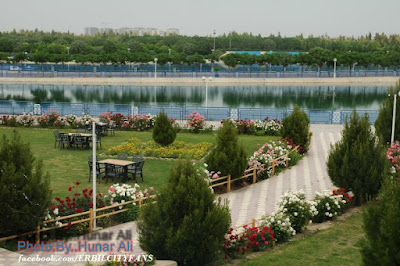A British university is breaking new ground in international collaboration by working with a Kurdistan University to set up an English Language centre for students. It will be located in Erbil (Hewler), the capital city of the Federal Region of Kurdistan - Iraq.
This capacity-building project between the University of Leicester and the University of Kurdistan-Hewler (UKH), in northern Iraq, will provide new opportunities for students to take English language qualifications in their home country, and in the region. The UKH-University of Leicester International English Language Centre will equip students for courses in English at home or abroad and will be an important focus for strengthening English language speaking in the region.
The focus will be on capacity-building, with a programme of development visits by staff from Leicester's highly rated English Language Teaching Unit to work with and train up lecturers in Kurdistan to build a centre that will administer qualifications and assist in improving the English language skills of the population -- an aim that the Kurdistan government sees as a key part of its modernisation programme. As opportunities arise, staff could be seconded to Kurdistan.
The announcement comes as the government of Kurdistan pursues the growth of higher education as one of its top priorities. In recent years the country has invested in its existing universities and built new ones, including UKH (established in 2006), where courses are taught in English.
Over a succession of visits between Leicester and Kurdistan universities, including Dohuk, Nawroz, Salahaddin, Soran, and UKH, important academic partnerships across a range of subjects, from English and Translation Studies to Geology, Computer Science and Engineering, have created the framework for the new Centre.
Roger Smith, the Director of the English Language Teaching Unit in Leicester, says the new venture will “make an important contribution to the professional development of English language provision in Kurdistan.”
He added: “We have plans to work with our partner to increase access to internationally recognised English language tests and qualifications.”
"We've been delighted with the performance of the students from Kurdistan who are currently studying in Leicester and we hope this relationship will encourage more to follow."
The current English language provision in Kurdistan and neighbouring countries has not kept pace with rising demand which has made it difficult for talented scholarship candidates to meet the UK Border Agency's visa requirements.
Professor Douglas Tallack, Leicester's Pro-Vice Chancellor (International), said collaboration was planned on curriculum development, assessment, drawing up materials and tutor training.
“Universities which simply visit Kurdistan to recruit students make little contribution to capacity building in Kurdistan and the wider region”, he said.
David Hall, the University’s Registrar, added: "We are not going into this collaboration to make a profit but as a two-way relationship of academic collaboration that will benefit both sides and help to raise our profile in a dynamic country that is energetically engaged in democratic modernisation post Saddam."












